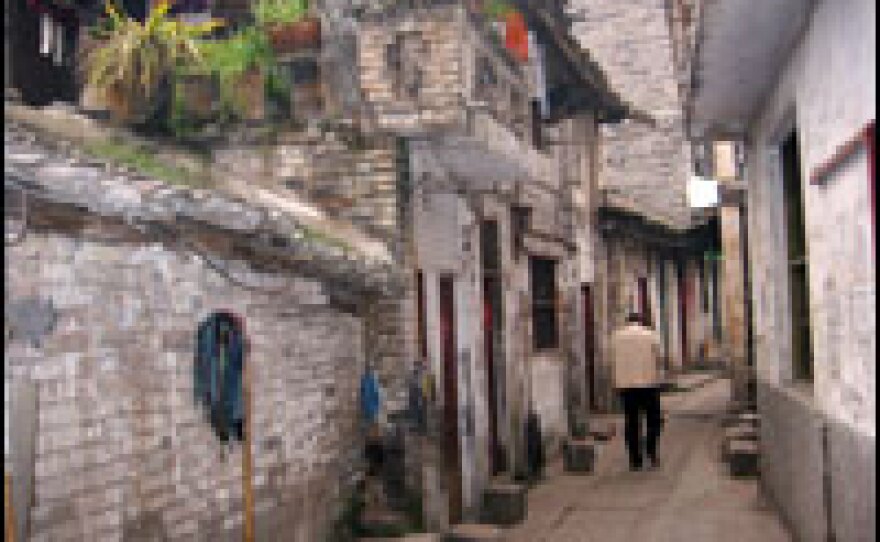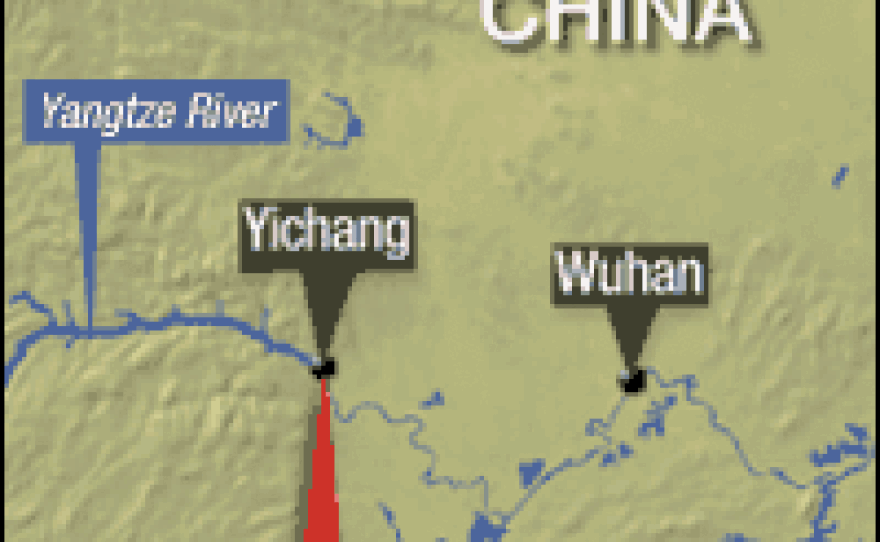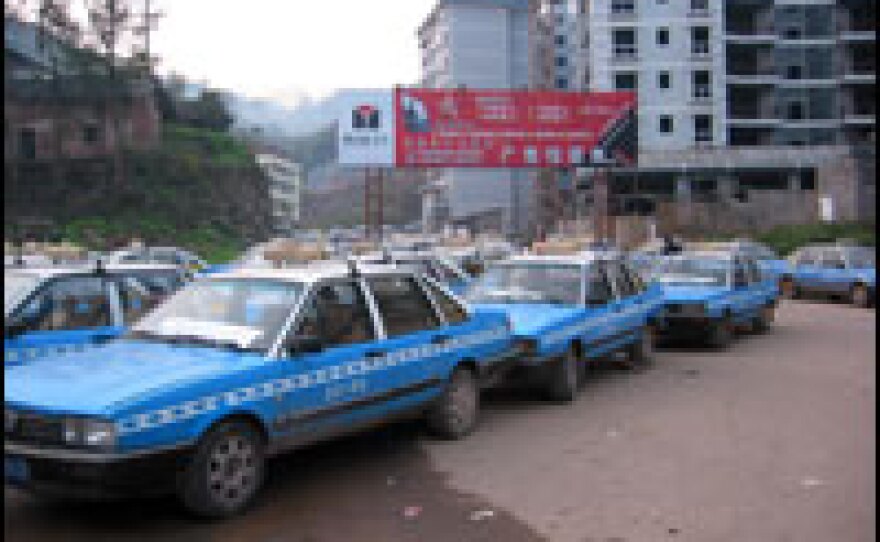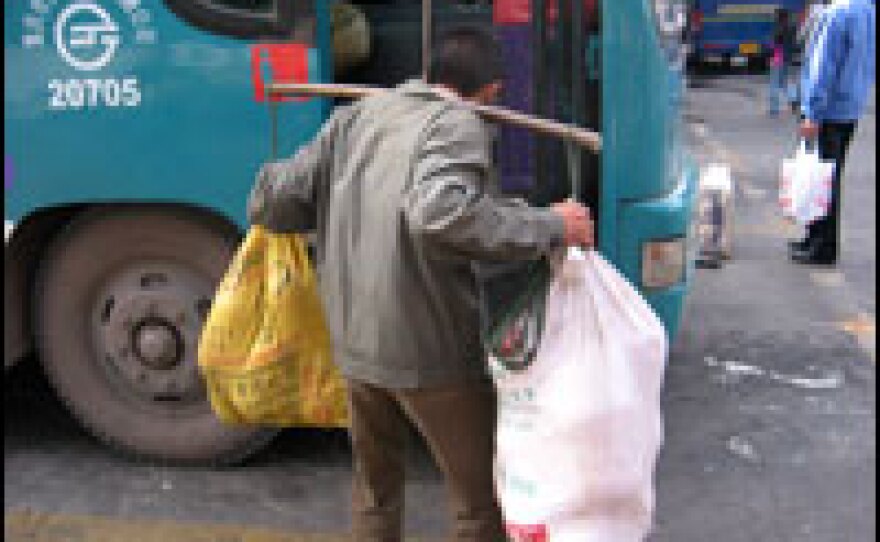



The Three Gorges Dam on the Yangtze River in China is one of the world's most ambitious engineering projects — and part of the challenge is relocating the 1.3 million people whose homes and fields are being submerged in the reservoir.
China's government says that the mass migration project is going smoothly, with most of the residents already having moved. Some have been relocated to other provinces and others just uphill from the site.
Some people have profited from the changes, while many others have suffered.
Homes Lie Underwater
Many of those relocated say it's a funny feeling to float over where their old homes used to be.
Ran Hongsheng is a local ferryboat captain in Yunyang County who says his former home is now about 65 feet below the surface of the river.
"It's all underwater now," he says. "The soil down there was really good. We grew vegetables and took them to the county seat to sell. Our income was pretty good in those days."
Ran now lives up hill from his old home. He notes that some folks wanted to move away but couldn't, while others didn't want to leave but were forced to.
"I wanted to move, but got no chance," says Ran. "We live on the south side of the Yangtze. Folks on the north side moved to Shanghai, where things are much better. All of those families got rich."
The Last County Town
The last major county town to be demolished is Kaixian. Musicians play traditional music outside a funeral home in the old town, as if to mourn the demise of the 1,800-year-old settlement with its tree-lined alleys and weathered wooden houses.
Up the hill, music blares from stereo speakers in a new shop where Yu Haiyang, 23, sells down jackets. This is the new county town where high-rise hotels, Internet cafes and fast-food restaurants are springing up.
Yu says he thinks the government is doing a good job of moving the Three Gorges residents and that he doesn't see why Western media are so critical.
He picks up a Chinese newspaper with a report on the Three Gorges. The headline reads, "Western Media Ask Pointed Questions. China Refutes Exaggerated Rumors."
"Many foreigners say that China exerts a bad influence in the world. I don't agree with that," he says.
Unemployment and Discontentment
But signs of discontent around the Three Gorges are hard to miss. In the county town of Zhongxian, taxi and bus drivers are on strike. The drivers and police watch each other nervously as they mill around the bus station. The streets are filled with stranded residents.
"All of us are laid-off workers or people whose homes were inundated by the Three Gorges reservoir," says one strike organizer who asked that his name be withheld for fear of being arrested. "We bought our vehicles with our relocation subsidies and just started to get some income, when a local company tried to grab a controlling stake in our privately owned buses."
The creation of the reservoir forced two-thirds of local industries to close. Unemployment in the area stands at 12 percent. The strike organizer says the drivers are desperate.
"All the money we earned with our sweat and blood, these bosses are trying to take at once and call their own," the organizer says. "What are we ordinary folks to eat?"
Relocated Families Struggle
In Wushan County, the government arranged for Huang Yihui to move to Guangdong province, one of China's richest. But she says her son faced discrimination when he tried to join the army there. The government registered her in Guangdong but registered her son in another province, splitting up the family. So she moved back to Wushan County.
Huang says tearfully that she got no compensation for the family food-processing plant she lost in the relocation. She protested to officials, who had her thrown in jail, but she says she still supports the Three Gorges project.
"Our fine family has been bankrupted and split apart, but we don't blame the central government," Huang says. "Perhaps these were errors committed by local officials. We can forgive them. But we want to get our business back and restore our family to the way it was before."
The government says that nobody has been forced to move and it denies widespread corruption. China's National Audit Bureau said that as of 2006, local officials had embezzled or misused $40 million — or less than 1 percent — of the central government's $7 billion in resettlement funds.
But Wang Tianmin, a Yunyang county official in charge of relocating residents, says, "the people who relocated up the hillsides and to other towns are basically pretty stable. It's just a minority of people who are having difficulty leaving their old homes because of their desire for personal gain."
From Rural to Urban
The central challenge the government faces is how to move its rural poor away from the reservoir and into the cities.
The government in Chongqing, the biggest city on the reservoir, wants to create jobs to attract 4 million country dwellers into the city in the next 10 to 15 years.
But life for Chongqing's new urbanites is not easy. Xiong Yingkui, 39, came to Chongqing about five years ago. He became a "bang bang" man — a porter carrying loads on a "bangzi," or shoulder pole. You can see the bang bang men all over Chongqing, carrying shopping bags, suitcases and live chickens. Xiong says he doesn't feel rooted in the city.
"I'm not sure what my next move will be, after my child grows up. I'm not really settled here," he says. "If this job doesn't work out, I'll try something else."
Xiong gets paid two yuan, or about 25 cents, for hauling a passenger's bags at the bus station. With luck, he can clear $135 in cash a month, which definitely beats farming.
But Xiong says he sometimes faces discrimination as a bang bang man.
"Sometimes, I get some damn boss who looks down on me. He swears at me. He says he won't pay, and I can do whatever I like about it. But there's nothing I can do. Who the hell does he think he is? If he doesn't pay, then forget it. I can't fight him," Xiong says.
This is just the fate of the bang bang men, Xiong says — whatever changes, Chongqing will always have bang bang men because people will always need to carry things uphill from the boats and the river.
Copyright 2022 NPR. To see more, visit https://www.npr.org. 9(MDAzMjM2NDYzMDEyMzc1Njk5NjAxNzY3OQ001))







